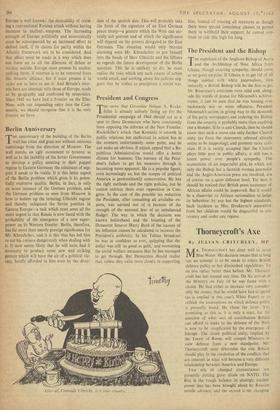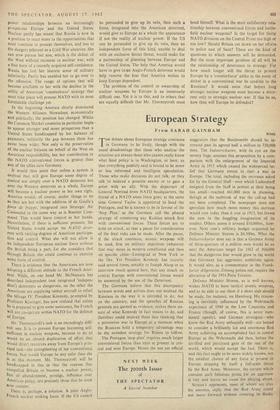Thorneyeroft's Axe
By JULIAN CR1TCHLEY, 11P
Mg. THORNENCR011 has done well to scrap Blue Water. His decision means that at long last an attempt is to be made to relate British defence policy to her diminished capabilities. To do less rather better than before. Mr. Thorncy- croft has not wasted any time, On his arrival at the Ministry on July 14 he was faced with choice. He had either to increase very consider- ably the money that he would have had to spend (as is implied in this :,ear's White Paper) or to rethink the assumptions on which defence policy is presently based. He chose the latter. Yet, promising as this is, it is only a start, for the question of what sort of contribution Britain can afford to make to the defence of the West is now to be complicated by the emergence of Europe. The closer political unity, implied by the Treaty of Rome, will compel Ministers to view defence from a new standpoint. Mr. Thorneycroft must determine the role Britain should play in the resolution of the conflicts that are inherent in what will become a very different relationship between America and Europe.
Two sets of changed circumstances are presently putting great strain on NATO. The first is the rough balance in strategic nuclear power that has been brought about by Russian missile advance, and the -second is the chancing
Power relationships between an increasingly prosperous Europe and the United States.
Nuclear parity has meant that Russia is now in a position to react more to the opportunities that must continue to present themselves, and less to the dangers inherent in a Cold War situation. She can now pursue her aim, which is the defeat of the West without recourse to nuclear war, with a flair born of a recently acquired self-confidence.
Russia has lost her historic sense of military inferiority. Parity has enabled her to go over to the offensive. The range of options that will become available to her with the decline in the Utility of American 'counterforce' strategy that must take place will present NATO with its most formidable challenge yet.
In the beginning America clearly dominated the Western Alliance. Nowadays, economically and politically, the position has changed. Whilst the Common Market countries in particular begin • to appear stronger and more prosperous, than a United States handicapped by her balance of .
Payments, militarily the gap between them has never been vQider. Not only is the preservation Of the nuclear balance on behalf of the West an American responsibility, but her contribution to the NATO conventional forces is greater than any of the allies save Germany.
It would thus seem that unless a system is evolved that will give Europe some degree of control not simply over a NATO deterrent but over the Western deterrent as a whole, Europe Will become a nuclear power in her own right.
America would, of course, prefer things to be
as they are but with the addition of de Gaulle's force de frappe, integrated into Strategic Air
Command in the same way as is Bomber Com- mand. This would leave control in her hands. Nevertheless, if there is sufficient pressure, the United States would accept the NATO deter- rent with varying degrees of American participa- tion and control. What she will not allow is an independent European nuclear force without the British being a part, for she considers that through Britain she could continue to exercise Some form of control.
There is evidence that the Americans are now adopting a different attitude to the French deter- rent. While, on one hand Mr. McNamara has described independent (not integrated 'indepen- dent') deterrents as dangerous, on the other the Americans are supplying tanker aircraft to refuel the Mirage IV. President Kennedy, prompted by Professor Kissinger, has now realised that unless he is prepared to give some assistance, he French Will not co-operate within NATO for the defence of Europe.
Mr. Thorneycroft's task is an exceedingly diffi- cult one. It is to prevent Europe becoming self- sufficient in nuclear .weapons, because to do so Would be an absurd duplication of effort that would divert resources away from Europe's prin- cipal task--the strengthening of her conventional forces. Nor would Europe be any safer than she 15 at this moment. Mr. Thorneyeroft will be handicapped in this in that the reasons that Compelled Britain to become a nuclear power, fear of abandonment, prestige, influence over American policy, are precisely those that he must now counter.
There is, perhaps, a solution. A joint Anglo- French nuclear striking force. If the US cannot
be persuaded to give up its veto, then such a force, integrated into the American deterrent, would give to Europe as a whole the appearance if not the reality of nuclear power. If the US can be persuaded to give up its veto, then an independent force of this kind, unable to deal with an exclusive Soviet threat, would make for a partnership of planning between Europe and the United States. The help that America would have to give to-an Anglo-French deterrent would help remove the fear that America wishes to keep Europe dependent.
The problem of the control or ownership of nuclear weapons by Europe is an immensely difficult one. Yet it is to this, and to others that are equally difficult that Mr. Thorneycroft must bend himself. What is the most satisfactory rela- tionship between conventional forces and battle- field nuclear weapons? Is the target for thirty NATO divisions on the Central Front too high or too low? Should Britain cut down on her efforts to police east of Suez? These are the kind of questions to which answers will be demanded. But the most important problem of all will be the relationship of deterrence to strategy. For how much longer will the threat to protect Europe by a 'counterforce' strike in the event of defeat in a conventional war be credible to the Russians? It would seem that before long strategic nuclear weapons must become a deter- rent only to strategic nuclear war. If this be so, how then will Europe be defended?































 Previous page
Previous page